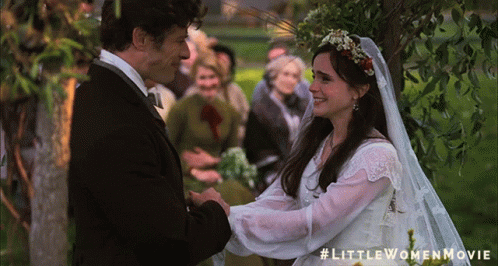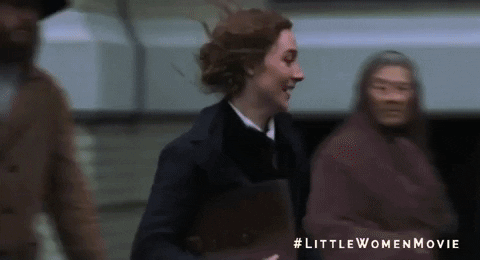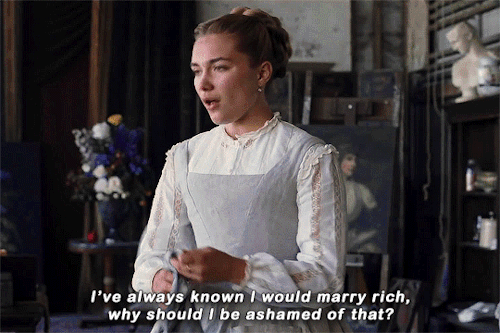Picture this: me as a child, walking into a old-fashioned sunlit room in a little brown house in America. In front of me, fixed to the wall between two windows, is a cream-coloured semicircle of wood. There’s an inkwell standing on it, and a sheet of paper covered in neat handwriting. The child-me looks so entranced by this little desk that the tour guide, whose job it is to keep children’s hands off the important old furniture, smiles and tells me I can touch it. I do, and my head is filled with the dizzying idea that my hand is touching the place where my favourite writer wrote my favourite book. This is the desk where Louisa May Alcott wrote Little Women.
Up until that point, I had only read an illustrated children’s edition of Little Women, but that day my parents bought me the complete, unabridged version for the first time. I’m not sure how many times I read it after that, but that copy – significantly more dog-eared now, with pages so heavy so that it flops about like Jo languishing on a sofa – is the same copy that I have just finished rereading, for the first time as an adult. The story is still as precious to me as ever, and it takes me back to being a child again – my head full of the joys and sorrows of Meg, Jo, Beth and Amy.
I’ve also just been to see Greta Gerwig’s new film adaptation of Little Women for the second time, and so I’m well placed to notice the ways in which it is faithful to the book (there are many; plenty of the dialogue is lifted from the page verbatim), and the ways in which it is different. It’s the differences I want to examine today – in particular, three sections of dialogue that aren’t in the original text, but through which Gerwig has cleverly updated the feminism of Little Women, while still staying true to the story and the characters.
[Book and film spoilers ahead.]

Meg on aspiration
Just because my dreams are different than yours doesn’t mean they’re not important.
In the film, Meg says this line when Jo is trying to convince her to run away on the morning of her wedding. Meg tells her sister that she wants to marry and make a home and have children; Jo, the fiercely independent tearaway of the family, doesn’t feel this desire herself, but Meg helps her to see that they have different dreams and that’s OK.
This is an idea that feminism has struggled with for a long time – particularly more radical Second-Wave feminism, which rejected traditional femininity to such an extent that it came to be seen as ‘unfeminist’ to want to wear make-up and heels, or to marry, settle down and have kids. Now there is greater recognition of the idea that feminism is about freedom of choice: whether a woman chooses to follow the ‘traditional’ path or not is up to her, and she should be able to do either without judgement.
Although Meg’s new line isn’t in the original book of Little Women, the spirit of it is certainly there, in the characters of the four sisters. Alcott’s story is about four very different women with very different aspirations, and even though Jo is clearly the main character (and the most like Alcott herself), the other sisters are not written to be ‘less than’ her. I don’t think the book glorifies Jo’s independence to such an extent that it condemns the others. Alcott isn’t saying we should all be like Jo; she’s saying there are many ways to be, each with its triumphs and defeats, but ultimately they’re all valid.

Amy on marriage
As a woman I have no way to make money, not enough to earn a living and support my family. Even if I had my own money, which I don’t, it would belong to my husband the minute we married. If we had children they would belong to him, not me. They would be his property. So don’t sit there and tell me that marriage isn’t an economic proposition, because it is. It may not be for you but it most certainly is for me.
This speech is a brilliant distillation of the kind of oppression women faced in 1800s America, and I think Gerwig puts in these lines as much for the modern-day audience as for Laurie, who listens to Amy say them in the scene. Although Amy doesn’t say this speech in the book, the words certainly make sense coming from her mouth. She makes no secret of the fact that she wants to be comfortable, she wants to marry well and she wants to be the belle of sophisticated society – so of course she is clear-eyed and practical about how she is going to achieve this, as the daughter of poor parents.
But neither is she entirely mercenary – in the end she turns down Fred, who is very rich, because she doesn’t love him ‘the way she should’. She marries Laurie instead, who is also rich, and whom she loves very deeply. These things happen in the book, and they give Amy a happier ending than one purely driven by money, but Gerwig did change something in the Amy/Laurie relationship which I think it’s interesting to note.
In the film, when Laurie first suggests they might marry, Amy is upset because she doesn’t want Laurie to settle for her just because Jo rejected him. She says, ‘I won’t do it, not when I’ve spent my entire life loving you.’ In the book, Amy has not been in love with Laurie all her life. They are good friends and they like and respect each other, but Laurie and Amy only fall in love during the time they spend together in Europe. They are both changed by their circumstances – Jo’s rejection and Beth’s death – and so their relationship changes too, in a way that is unexpected to both of them. I think the ‘I have always loved you’ idea was probably brought in because there is simply less time in a film to analyse the slow, gentle development of love over a period of months, and the audience will believe the relationship more easily if at least one person in it is already fully committed. It’s an understandable change, but I think Alcott’s original is much better.
Jo on loneliness
Women have minds and souls as well as hearts, ambition and talent as well as beauty, and I’m sick of being told that love is all a woman is fit for. But… I am so lonely.
This is one of the stand-out lines of the film, and Saiorse Ronan delivers it beautifully. It perfectly captures Jo’s dilemma: she shouldn’t have to be in love, the world shouldn’t expect it of her, and yet she does still want to be. Fortunately, that love comes along in the form of Mr. Bhaer (who, by the way, is significantly younger and hotter than he is in the book), and the film ends happily for Jo. But it isn’t quite that straightforward – Gerwig makes the ending ambiguous, so it’s not clear whether the idyllic ending we see for Jo ‘really’ happens, or whether it’s something she writes into the novelisation of her own life in order to fulfil her editor’s advice: “If the main character is a girl, make sure she’s married by the end. Or dead, either way.” In any case, many readers and film-watchers have felt dissatisfied with Jo’s happy ending (and the fact that she doesn’t marry Laurie), and it’s worth delving a little into the history of Little Women to see what’s going on here.
Little Women was originally published in two parts: the first was published in 1868 and follows the four sisters as teenagers over the course of a single year. This volume ends with Mr. March’s return from war and Meg’s engagement to John. The second part was published the following year, in 1869, and the story skips ahead several years and covers a longer time span, so we see the sisters becoming older, wiser and settling down. During that gap between the two halves of the story, Alcott received plenty of feedback from readers about Part I, and letters from fans telling her how they hoped the story of the sisters’ lives would end. In the introduction to my copy of the book, Alcott historian Elaine Showalter quotes from a letter Alcott herself wrote about this response:
I don’t like sequels, and don’t think No 2 will be as popular as No 1 … but publishers are very perwerse & wont let authors have thier [sic] way so my little women must grow up & be married off in a very stupid style.
One thing she refused to do was to have Jo marry Laurie (“I won’t marry Jo to Laurie to please anyone,” she wrote), even though her audience expected it. That would have been the most obvious, romantic ending for Jo, but – crucially – Jo doesn’t love Laurie that way, and so it wouldn’t have made sense for her character. Instead, Alcott created a far more complex and realistic story by having Jo refuse him because she can see, sooner than he can, how they would be incompatible with each other as husband and wife. Here, Jo is taking a feminist stance: rejecting a man she doesn’t love, even though everybody else (and, indeed, the very structure of society) thinks they should be together.
But there is another, more modern objection to Jo’s ending: many fans think that she shouldn’t get married at all. Ultimately, Alcott did bend to the public’s and her publisher’s will by marrying Jo off, albeit not to your typical romantic hero (making it even more interesting that she does marry a heartthrob in the film). But Alcott did not go so far as to have Jo remain a spinster, and nowadays more and more people find it a shame that Jo doesn’t remain unmarried at the end of Little Women. Gerwig provides a good explanation for this in the exchange between Jo and her editor at the end of the film: Dashwood says, “If you end your delightful book with your heroine a spinster, no one will buy it. It won’t be worth printing.” And Jo replies, “I suppose marriage has always been an economic proposition. Even in fiction.” Ultimately, Alcott wanted to sell Little Women, and the audience at the time would have been far less accepting of Jo remaining unmarried. In fact, I don’t think it’s a stretch to say that quite a large proportion of the modern audience wouldn’t have been happy with Jo letting Mr. Bhaer leave and not running after him through the rain. Our attitudes may have progressed, but the desire to pair people up at the end of films is still very much alive.
On the subject of modern objections to Jo’s ending, Elaine Showalter writes: “these strong negative judgments now seem overstated and extreme, demanding from Alcott’s nineteenth-century female Bildungsroman a twentieth-century feminist ending of separation and autonomy”. In a strange twist of fate, the obvious ‘romantic’ ending for Jo now is for her to stay independent – but Alcott never wanted the obvious for her complex heroine. I think Gerwig handles her ending very deftly to try and satisfy both camps – she puts in enough ambiguity to suggest that Jo marries and that she doesn’t. That’s some very clever directing, and I think it’s capital!

In conclusion
Little Women is a fascinating, moving and complex story about women and society, and the fact that it is still being adapted more than 150 years after it was written is a sign that we still find it relevant and interesting today. This is partly because of Alcott’s insightfulness: she wrote about timeless themes that have carried across centuries. It’s also partly because some of the problems in the sisters’ lives are still with us today, so this story helps us to see how far we’ve progressed, and how much we still have to do.
This is exemplified by the updated feminist ideas Gerwig has put into her film. Back when it was written, Little Women held up a mirror to the society that it depicted, and Alcott made no secret of including ‘moral’ lessons in her story that were relevant to the time. This is not anachronistic – all forms of media and entertainment do this, regardless of what century you’re in. Gerwig’s film is a modern retelling of Alcott’s book, adapted for our times, and it’s fascinating to see how a story can be told and retold, and how a good adaptation speaks to a new audience and remains loyal to the original.
When you go and see Gerwig’s Little Women (which I absolutely urge you to do), remember that you’re not just watching a 150-year-old story play out on screen – you’re watching a dialogue between Gerwig and Alcott, a conversation happening across the span of decades. What a privilege that is.


Nice analysis. Your comparison between the film and the book has motivated me to read the book.
LikeLiked by 1 person
Great! I hope you enjoy it 🙂
LikeLike